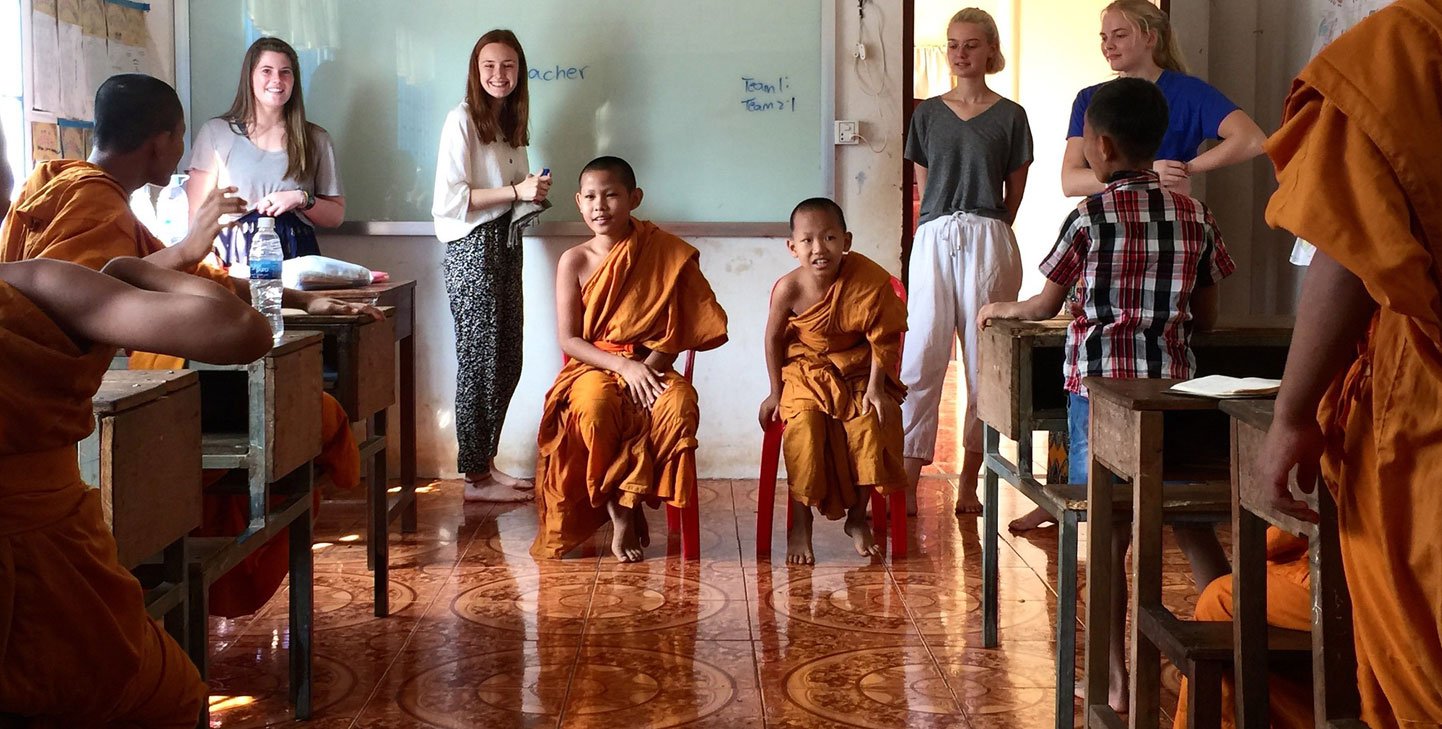Teaching Internships Abroad
Spark the potential for a brighter future.
Education is a powerful tool. Yet in many communities around the world, schools are often crowded and underfunded. Through a teaching internship with GVI, you’ll contribute to education programs that directly contribute to the United Nations Sustainable Development Goals, specifically Goal 4: Quality Education. From teaching English to programs focused on maths, science and business skills, you can make a lasting impact through education.
By participating in a teaching internship, you’ll gain career-boosting experience in education, while contributing to lasting change in the education system. Whether you’re working with local teachers to develop a curriculum, conducting academic research in a learning environment, or supporting a GVI team to assist with local education practices, your contribution will be felt long after your internship ends.
Empowering communities through education
Education breaks down barriers for growth and opportunity. When people have access to quality education, they’re given the chance to gain knowledge and skills and take charge of their own lives. While not everyone in the world has that access, at GVI we believe everyone should. Our programs are based in communities around the world where education access has been historically limited. You’ll work in collaboration with local teachers and build on the one-on-one support that students receive. Longer internships may also include a work placement at a local school.
During your education internship, you could also get involved in after-school programs focused on conversational English teaching for students of all ages. These are all important and transferable skills that will bolster your CV and increase your own employability.
Why do a teaching internship with GVI?
At GVI you can be sure that you’re working with an organisation that’s committed to upholding ethical best practices on all of our teaching internships, volunteer programs and volunteer activities. This is evident by our badge of ethics.
We also constantly review our ethics and safety policies to ensure your experience is the best it can be. For example, GVI doesn’t support orphanage volunteering in any of our programs. For more information see our stance on orphanage volunteering and our regularly reviewed Child and Vulnerable Adult Protection Policy.
All staff and participants are required to complete a police background check before arrival on their chosen program, and on-site child protection training is provided once they arrive to volunteer. To protect children from cyber and real-world threats, we ensure that our marketing material follows child protection best practices.
Filter programs
You’re unique and original. Your teaching internship should be too. Whether you’re looking to spend the summer gaining new skills, taking a gap year after high school or university, or just wanting to try something different, there’s a GVI teaching internship for you. We offer a range of education internship programs to fit your goals and interests.
Internships
Joining an internship abroad allows you to actively contribute to ethical education initiatives with measurable long-term impact. Internships provide hands-on experiences and the opportunity to collaborate with local organisations and partners. By addressing identified challenges in partnership with NGOs, schools and government organisations, you become part of the broader solution to create a better future.
GVI’s internships also offer personal and professional development opportunities, including qualifications, soft skills, mentorship, advanced leadership training and career guidance.
Professional apprenticeships
Our professional apprenticeships come with a career guarantee, ensuring that within 18 months of completing the program, you’ll secure an impact-driven job in sustainability. During the 6-month program, you’ll have the unique opportunity to work with community organisations, addressing critical development challenges for 12 weeks. Whether it’s partnering with local NGOs or securing a job placement at one of our community hubs, you’ll gain first-hand knowledge and contribute to local initiatives, enhancing your CV.
You’ll also benefit from our fast-track training program, equipping you with the essential hard and soft skills needed for a successful career. From accredited courses and mentoring sessions to leadership training and job portal access, we provide comprehensive support to maximise your professional growth and networking opportunities.
Research fellowships
Joining a research fellowship with GVI means you can make a real difference by tackling community challenges and gathering valuable knowledge through qualitative research. With guidance from PHD-qualified experts and projects tailored to your skills, you’ll gain hands-on experience in research methods and help find practical solutions.
Our comprehensive career guidance ensures that you’ll receive support in boosting your qualifications and securing a position in the sustainable development industry. We even offer a career guarantee, assuring you a job within 18 months of successfully completing the program.
GVI operates across the world in Africa, Asia, Australasia and Latin America. To read more about these specific locations, check out one of the links below. We offer teaching internship programs in the following countries:
The type of teaching experience and training you’ll get will largely depend on your location. Chat with our friendly enrolment team to determine the teaching internship opportunity that best matches your interests and goals.
For example, you could assist local teachers with lesson planning in Ghana, or gain work experience teaching adults and children in Nepal, or even obtain a TEFL qualification in Thailand.
On some of the longer teaching programs, like our teaching and community development professional apprenticeship in South Africa, interns join a work placement after three months, giving them more practical teaching experience.
Tailor your teaching experience to your schedule
Your internship can last between 2 and 24 weeks. This makes teaching internships an excellent option for summer break between school years, or for longer periods after graduation.
Whichever teaching internship you choose and however much time you can commit, our teaching internships abroad offer you a chance to make an impact while gaining real-world experience in education.
There’s no one-size-fits all teaching internship. At our community hubs around the world, the local communities have their own goals and aspirations for improving their education systems. We work with our local partners on the ground to develop education internships that will deliver the greatest sustainable impact.
From early childhood education to women’s education
You might contribute to lesson planning, classroom management and one-on-one teaching for creche, kindergarten or junior-school students. This type of teaching internship will see you involved in planning, designing and delivering classroom lessons to students of various ages. You’ll learn how to creatively use games and play to facilitate learning. The curriculum might include English, arts and crafts, maths, and literacy.
Or you could facilitate educational programming for older students and adults. For example, some of our interns work with after-school groups for high school students or facilitate workshops with local women. This type of teaching internship can contribute to valuable skills development in older students, opening up doors for educational and career opportunities.
Earn valuable qualifications while gaining teaching experience
If you’re interested in teaching English abroad, there are plenty of opportunities for this type of education internship with GVI. English proficiency is very important in many countries around the world, in particular where local communities rely on tourism income. You can gain English teaching experience and even earn a TEFL (Teaching English as a Foreign Language) certification on one of our education internships.
Before you join GVI on an education internship abroad, you probably have some questions! Our enrolment team is always available to provide answers. In the meantime, here are some of the most common international teaching internship questions and answers.
Are teaching internships abroad ethical?
GVI is committed to maintaining strong ethical practice across our programs. All staff and participants are required to complete a police background check before arrival on their chosen program. On-site child protection training is also compulsory.
We also prioritise sustainability on our programs. Because volunteers are temporary participants in our programs, we have to be careful to avoid disruptions in education. By partnering with and supporting local educators, we’re able to ensure continuity in education programs.
We’ve also developed ten ethical principles and five human empowerment principles that form the backbone of our ethical commitments. Interns are also required to interact with local communities in a way that respects and builds on their ownership of sustainable development projects. Improvements to our policies are made alongside trained GVI ethics officers as well as outside experts.
How long are the teaching internships at GVI?
Teaching internships can last anywhere from 2 to 24 weeks, depending on the amount of time you have to commit to the program. You could even combine two or more locations to experience education in a global setting. Our longer-term teaching internships include training on base and the option to take on a work placement.
What kind of support and training is offered on a GVI teaching internship?
When you participate in a GVI education internship abroad, you’ll have access to experts in the teaching field in the form of both our field staff and local community educators. You’ll also receive training based on your internship location, as well as special courses to support your own professional development.
GVI’s teaching internship support and training includes:
- Pre-program training including an expectation group call, our GVI around the world presentation, and GVI online leadership and specialisation courses endorsed by the University of Richmond.
- Comprehensive feedback and reference from your remote internship supervisor.
- Hands-on field experience in the educational sector.
- Training on sustainable development.
- Learning and practising teaching methods, lesson planning and classroom management.
- Gaining experience working with local communities.
- Being trained in health and safety or first aid.
- Potential teaching placements and preferential access to GVI employment opportunities.
Will I get paid to teach?
GVI offers unpaid teaching internships. The program fees you pay will cover your accommodation, meals, training, equipment and in-country transport to and from projects. These fees are essential to ensure that we are able to work with and support local organisations and provide sustainable community development. These fees also cover the coursework and practical training that will help you achieve qualifications like a Community Development certificate from the University of Richmond and a TEFL qualification.
To find out more on this topic, check out the article: Why pay to volunteer abroad.
Who will I be working with during my teaching internship abroad?
You’ll work with some amazing people from around the world, as well as local educators and community leaders. Volunteers, interns and GVI staff come from all around the world and, as a result, have different backgrounds and cultural beliefs. It’s likely that you’ll leave your internship with new life-long friends.
What happens during school holidays when schools are closed?
As you look to plan your teaching internship, discuss your timeline with one of GVI’s friendly enrolment managers. They’ll be able to provide insight into local school holidays and closures. Some of our bases participate in holiday programming for children and community members during this time. For example, in Cape Town, South Africa, we run a library program during school holidays.











































